fl's native frogs
1/73
There's no tags or description
Looks like no tags are added yet.
Name | Mastery | Learn | Test | Matching | Spaced |
|---|
No study sessions yet.
74 Terms
amplexus
the breeding “embrace” of frogs and many salamanders
global species diversity of amphibians
approx 8900 sp of amphibians
-frogs: ~7830 sp & 55 fams
-salamanders: ~825 sp, 10 fams
-caecilian: ~225 sp, 10 fams
fl species diversity of amphibians
approx 60 sp (including several introduced sp)
-frogs: ~30 sp & 7 fams (4 introduced sp breeding)
-salamanders: ~30 sp & 6 fams (all native)
-caecilians: 1 introduced sp breeding
family bufonidae - toads characteristics
-’dry’, rough, warty skin
-stout bodied
-parotoid glands present (toxin)
-very reduced rear-toe webbing
-no teeth (no teeth in lower jaw of anurans)
-toad pee= warts?
-one introduced sp of toad
*all toads are frogs- a toad is just a particular kind of frog
southern toad identification
brown, gray, reddish color; very patterned back; warty skin; cranial crests
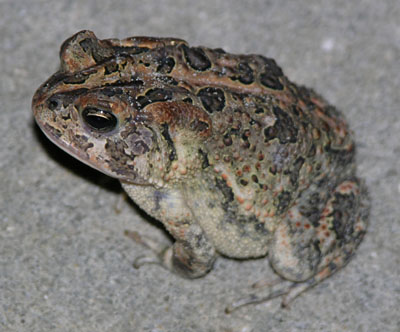
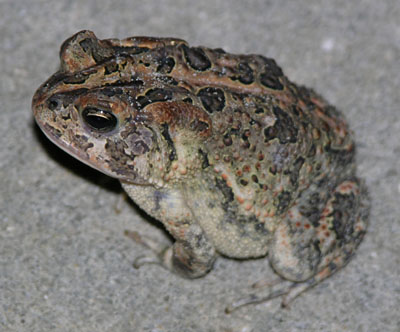
southern toad habitats/range
flatwoods, sandhills, scrub, hammocks, suburban settings; ditches, retention ponds, isolated wetlands, oxbows, river margins; all state
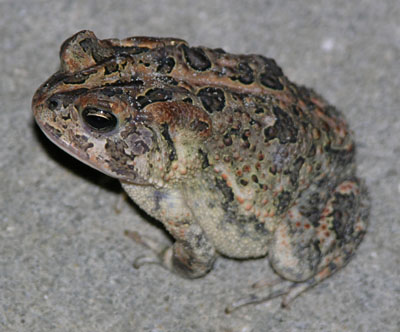
southern toad other info
commonly seen on sidewalks on damp warm nights, prominent parotoid glands, distasteful to pets but not harmful
oak toad identification
usually gray to brown w dark blotches, light stripe down back, parotoid glands, low cranial crests, orange feet, FL’s smallest toad (max SVL =1.5 in)
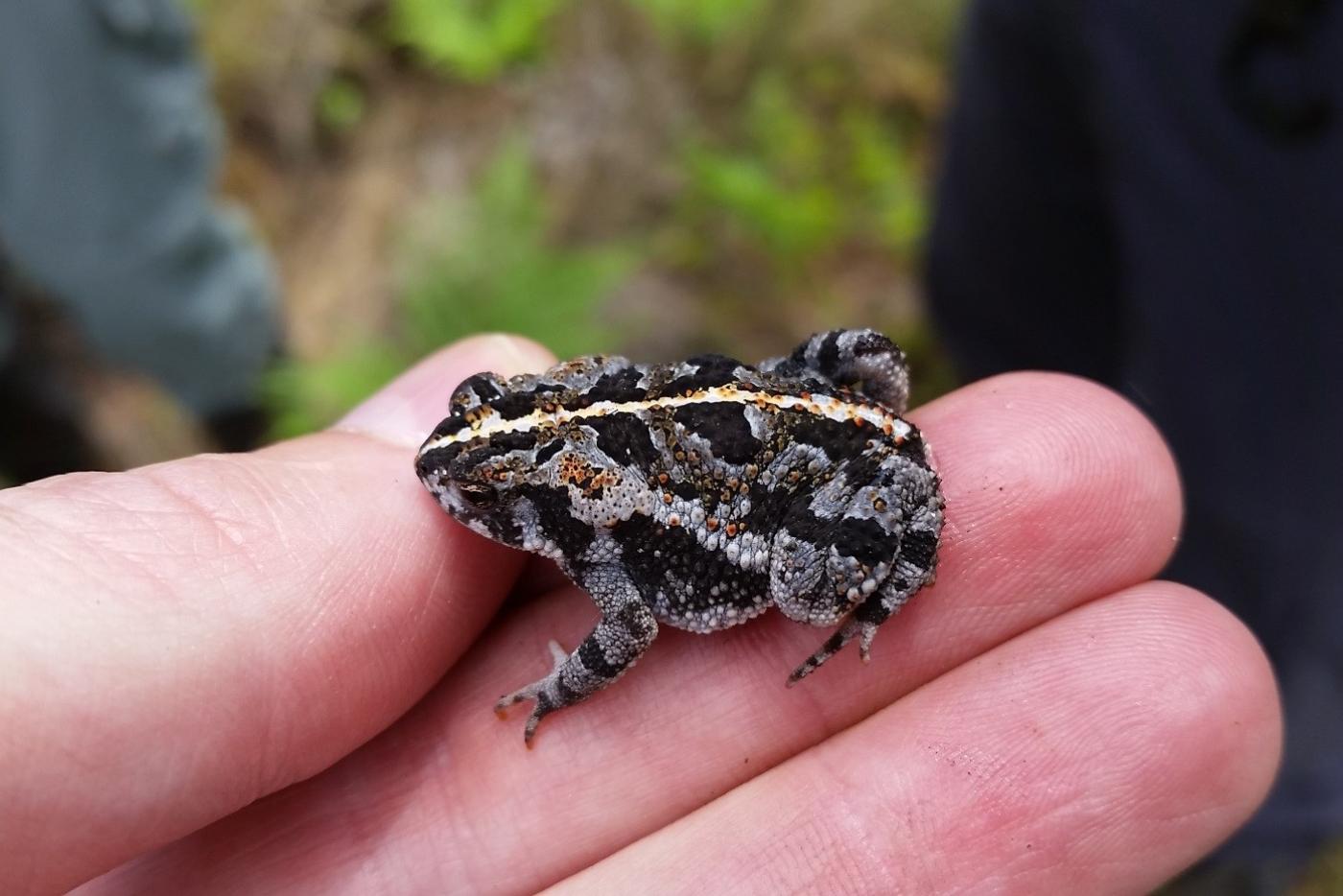
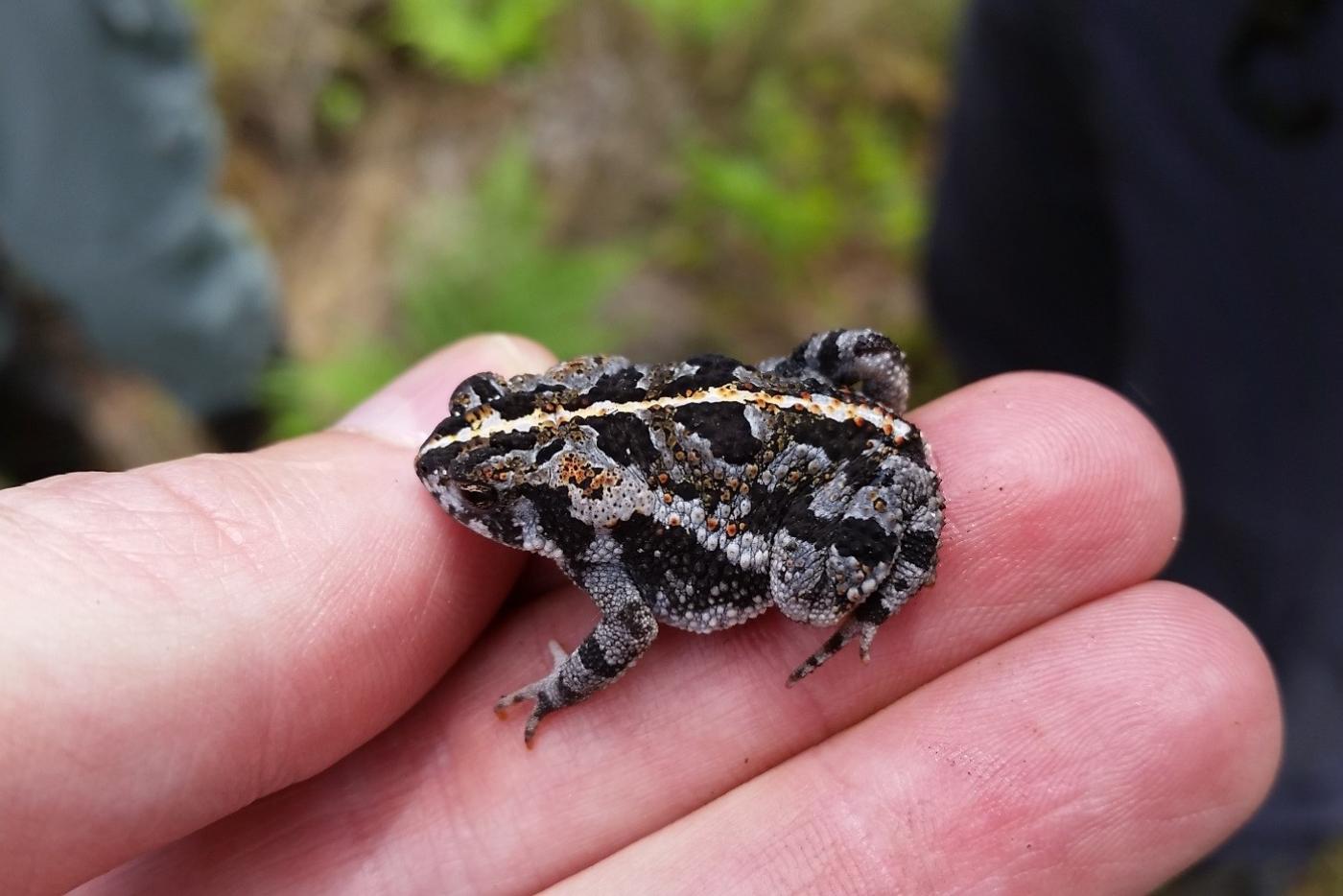
oak toad habitats/range
flatwoods, sandhill, scrub, isolated wetlands that lack predatory fishes, ditches, swales; all state
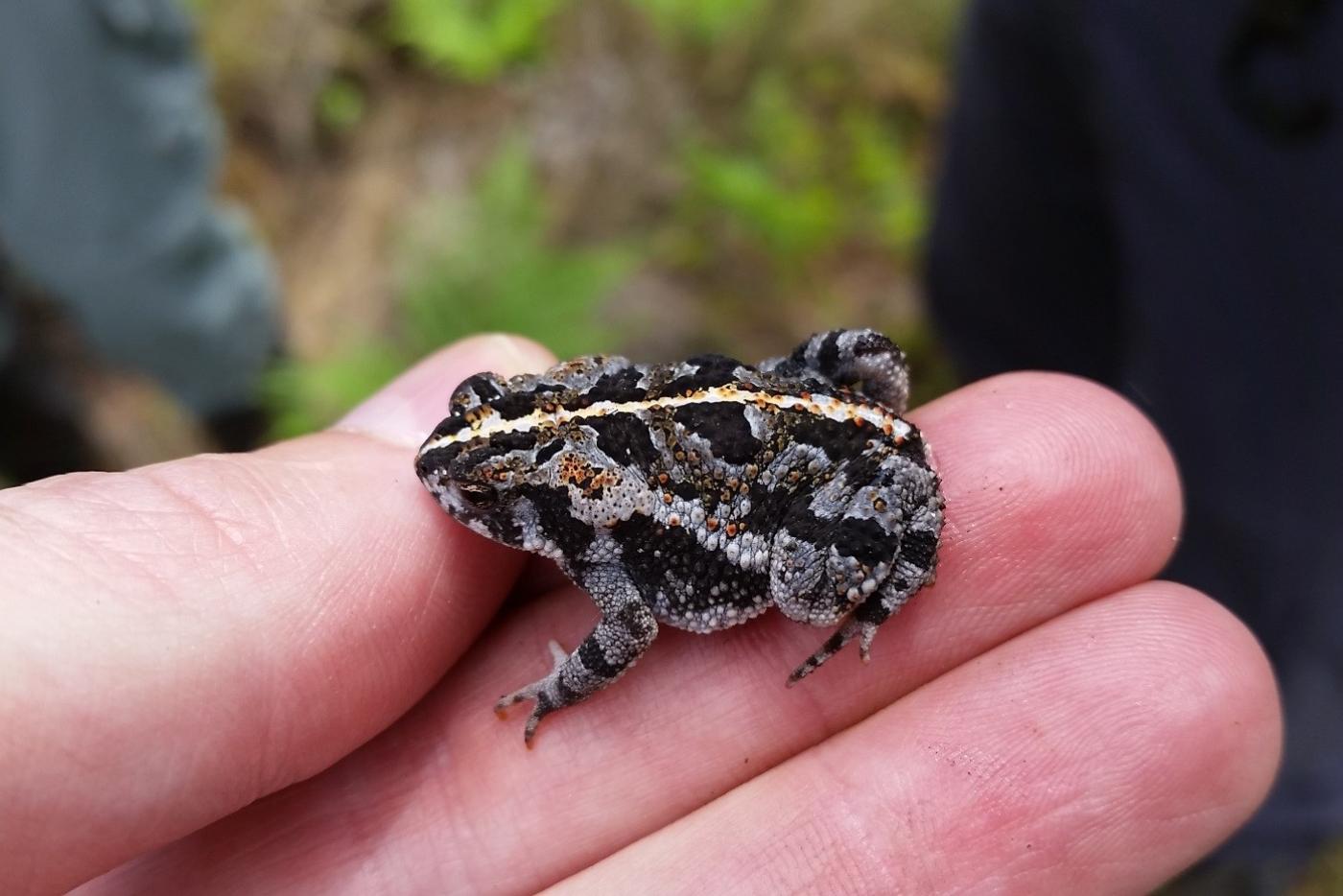
other oak toad info
a cute ‘elfin’ toad, call is a high-pitched peeping, lay eggs in short strings, pref for eating ants
family hylidae (treefrogs, chorus frogs, cricket frogs) general info
-14 native sp
-quite a variable group in FL
-toe pads in Hyla (excellent climbers, arboreal)
-reduced rear-toe webbing except Acris
-terrestrial except Acris
-some sp common in suburb areas
-one introduced sp
green treefrog identification
green to olive colored w distinct white line down sides, dorsal coloration above and below line, often has small yellow spots on back
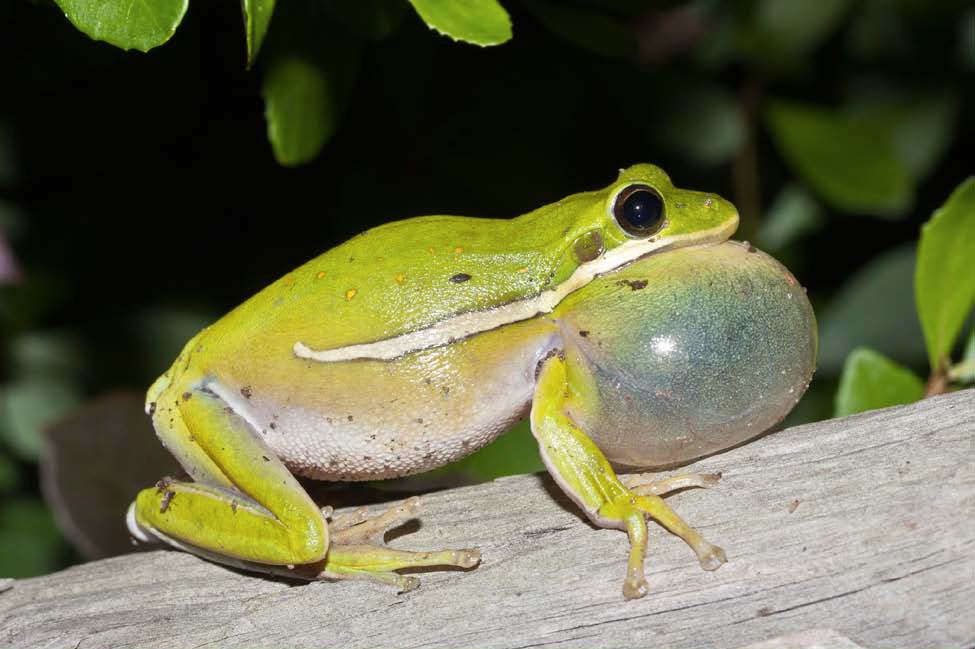
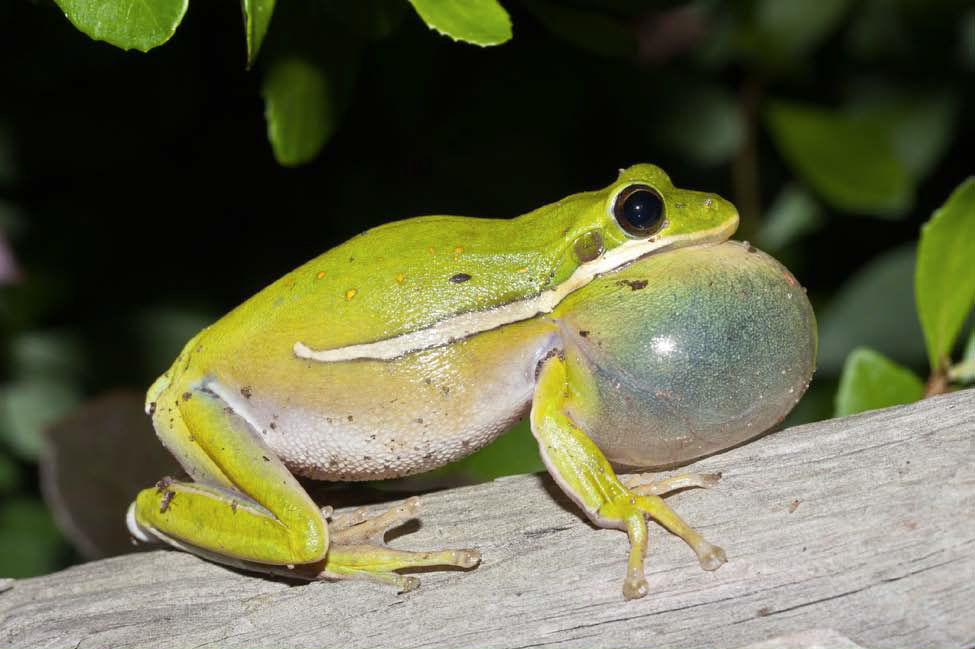
green treefrog habitats/range
flatwoods, margins of wetlands, hammocks, suburb settings; swamps, lakes, retention ponds, isolated wetlands; all state
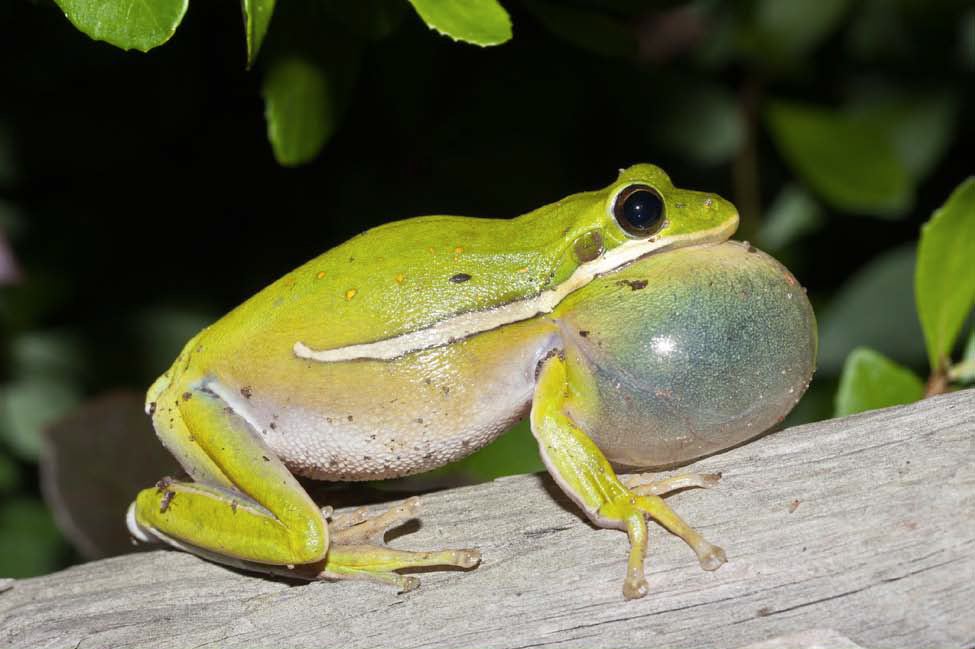
green treefrog other info
white line absent in some inds- rarely though
squirrel treefrog identification
green to brown frog- quite variable, patterned or not, often a light-colored jagged line on side (not clearly demarcated), tympanum often bronze colored
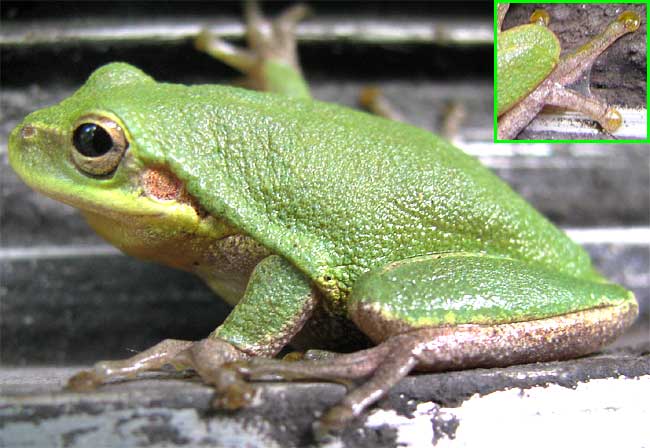
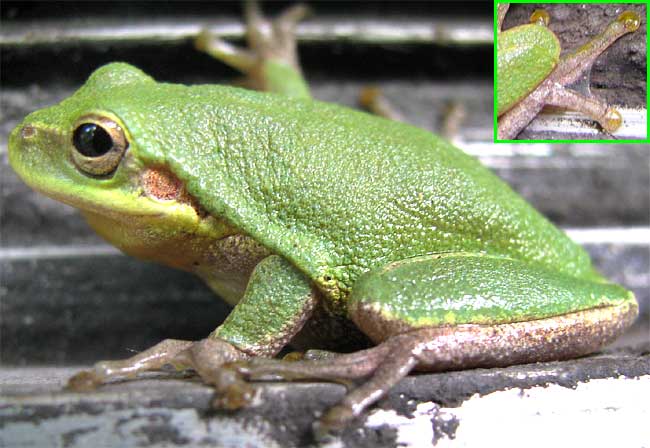
squirrel treefrog habitats/range
flatwoods, hammocks, suburban settings; retention ponds, ditches, isolated wetlands; all state
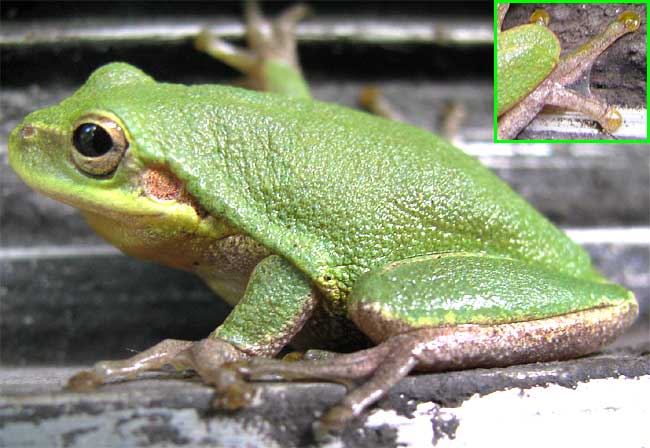
other info about squirrel treefrog
smaller than green treefrog, and snout more rounded, appear to have declined in suburb areas of SFL, eaten by Cuban Treefrogs
pine woods treefrog identification
usually gray to brown but can be a muted green, pattern on back may or may not be visible, light spots on thighs, darkish mask through eye
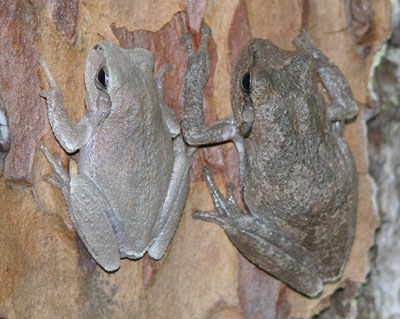
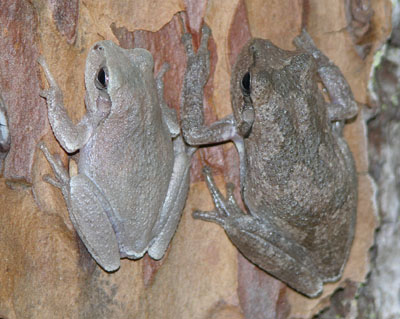
pine woods treefrog habitats/range
pine flatwoods, sandhills; isolated wetlands and ditches that lack predatory fish; most of state except southern central tip
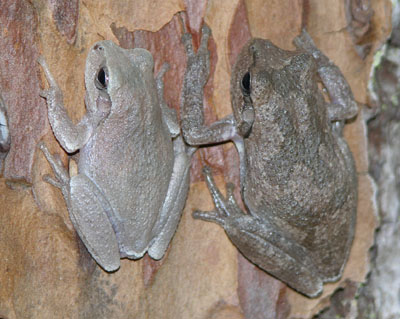
pine woods treefrog other info
very young inds lack thigh spots, tadpole with orange/red tail fin, flagellum
barking treefrog identification
brown or green frog most often with large spots on back, stout-bodied for a treefrog, granular skin
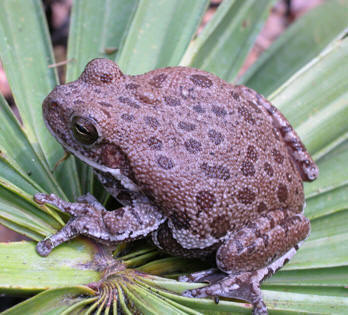
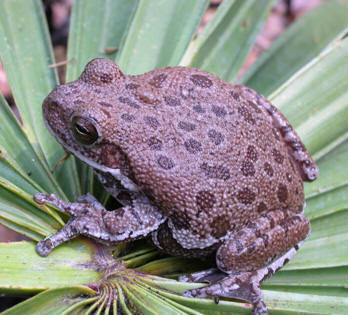
barking treefrog habitats/range
flatwoods, sandhills; only breeds in isolated wetlands that lack predatory fishes; all of state except southern/central tip
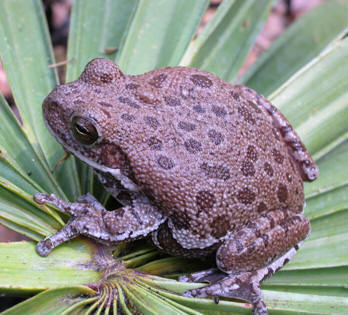
barking treefrog other info
very arboreal, largest native treefrog, was proposed as FL’s state amphibian, a handsome devil for sure
cope’s gray treefrog identification
gray or greenish but variable, dark markings on back, warty skin for a treefrog, light blotch under eye, yellow-orange wash on inner thighs
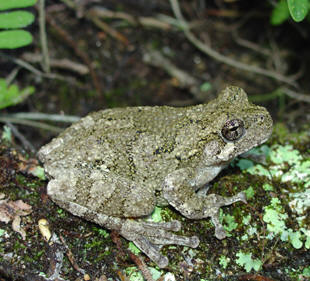
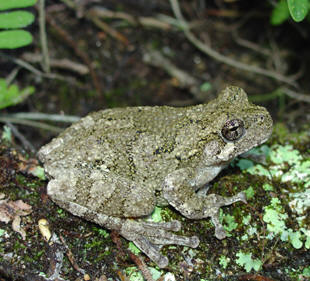
cope’s gray treefrog habitats/range
hardwood forests, forested floodplains, shrubby habitats near water; isolated wetlands, floodplain pools; very north fl, panhandle
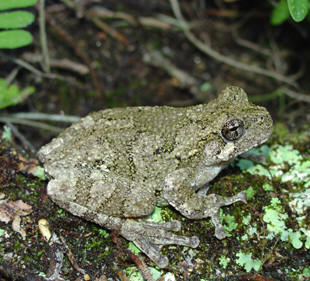
cope’s gray treefrog other info
call is loud coarse trill, very cryptically patterned, looks a lot like the bird-voiced treefrog
southern spring peeper identification
small, reddish brown frog with X pattern on back
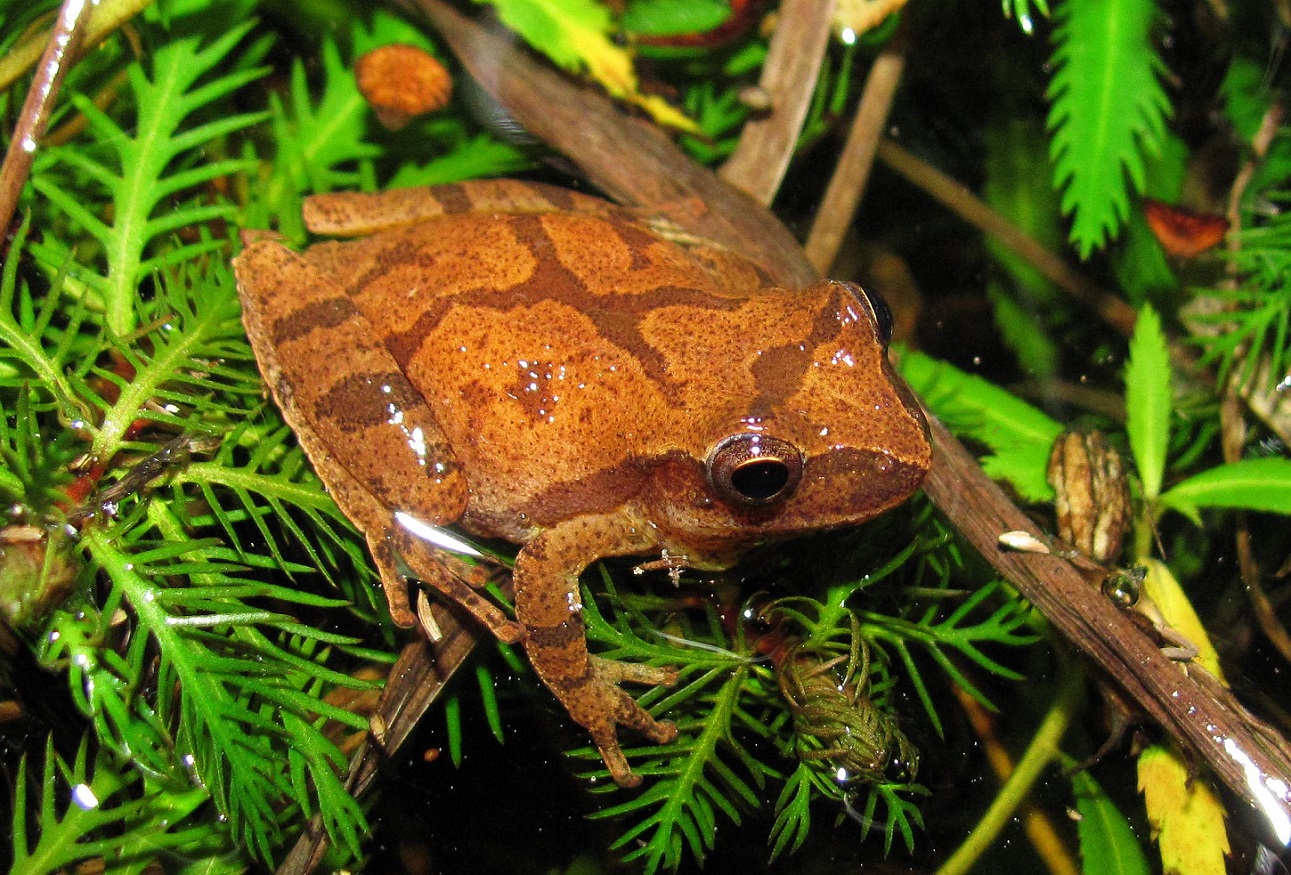
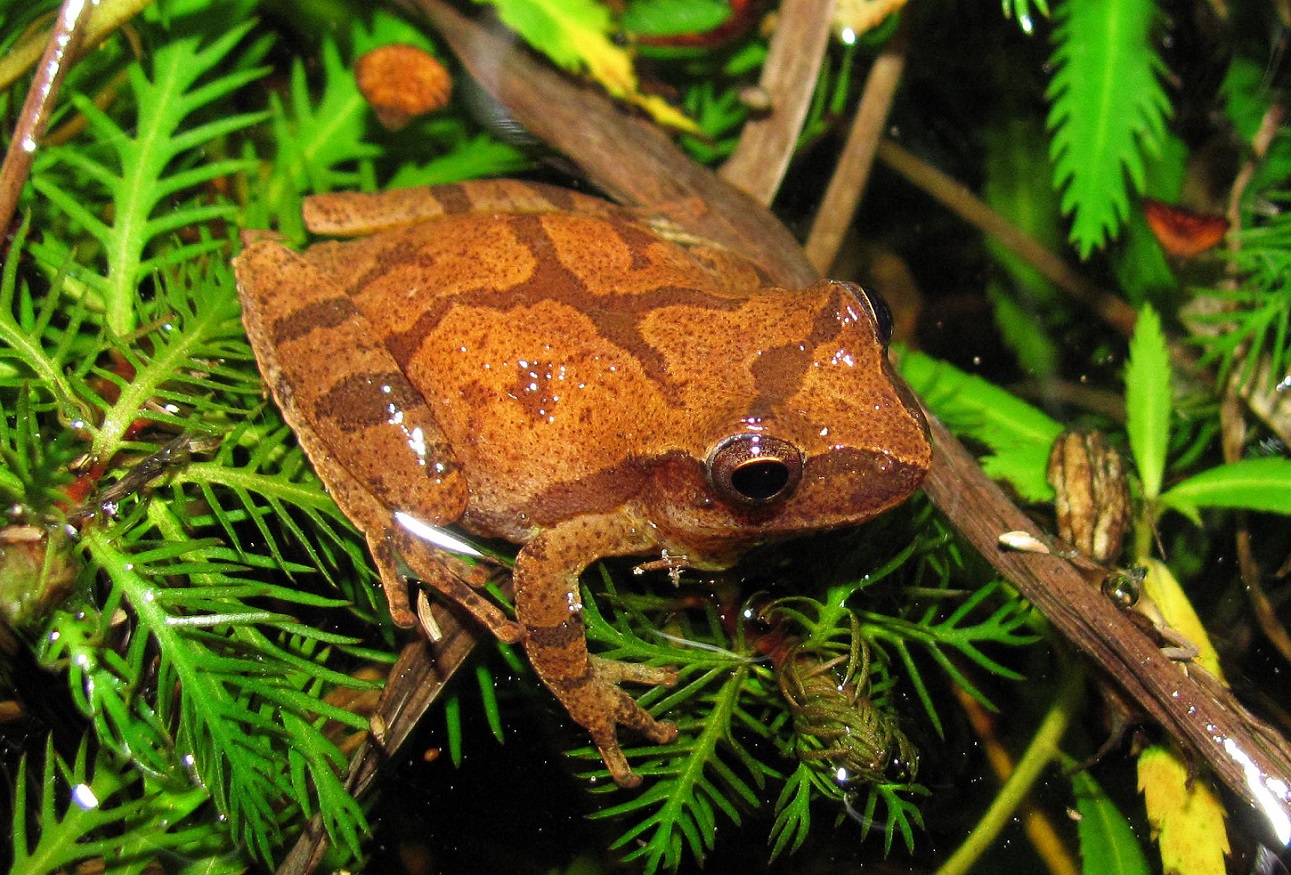
southern spring peeper habitats/range
hammocks, swamps, floodplains; isolated wetlands, retention ponds, floodplain pools; north florida except tip of panhandle
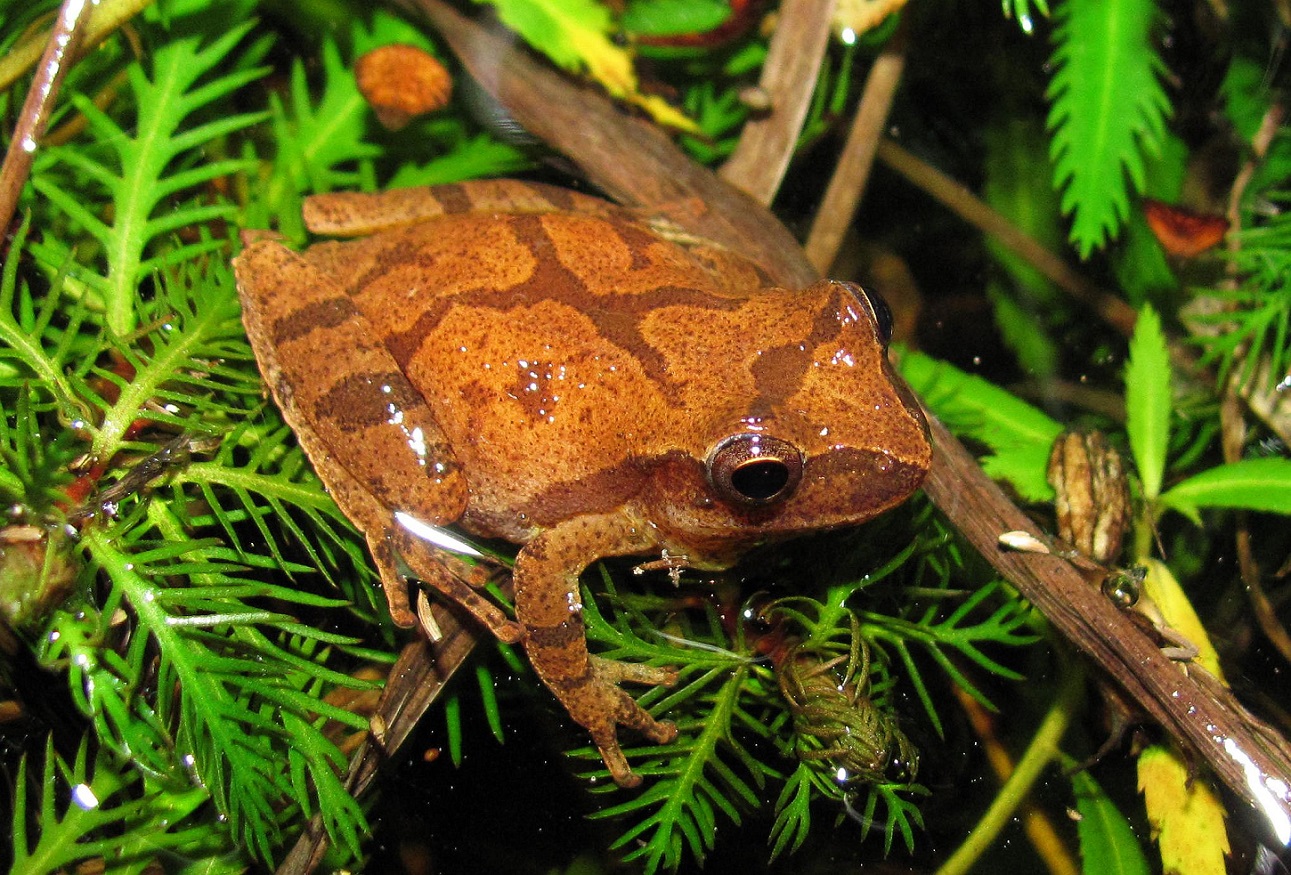
other southern spring peeper info
most arboreal chorus frog, small toepads, winter breeder in fl, calls deafening in large choruses, rarely seen unless calling
southern chorus frog identification
gray to almost black frog with several rows of dark spots, pointed snout, lip all white or white spots
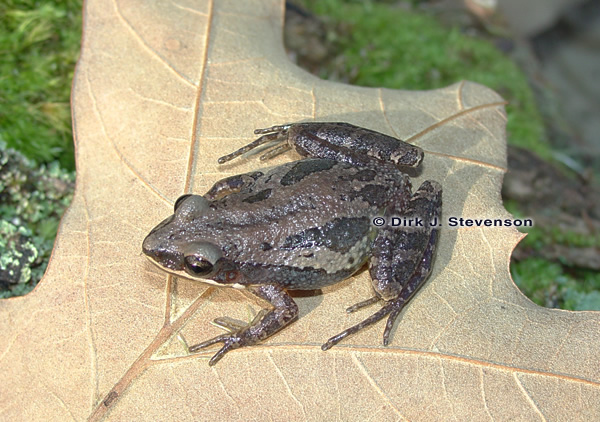
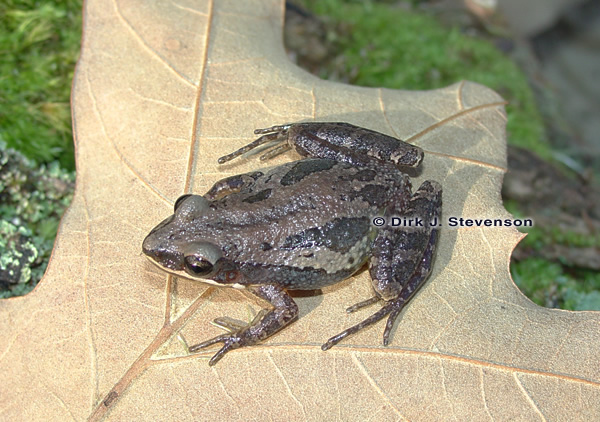
southern chorus frog habitats/range
flatwoods, grassy fields, ditches and isolated wetlands that lack predatory fishes; all state, different morphs in northern/southern state
southern chorus frog other info
very cryptic, only encounter these frogs when they are breeding- all months
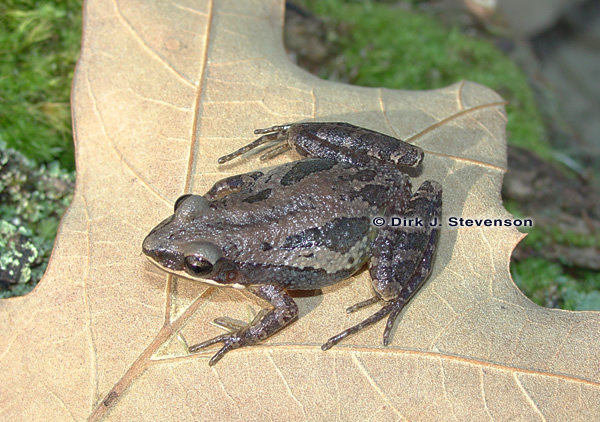
little grass frog identification
small, bronze/brown/gray colored, dark mask extends down each side of body
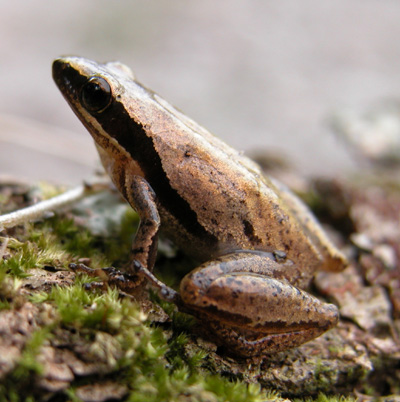
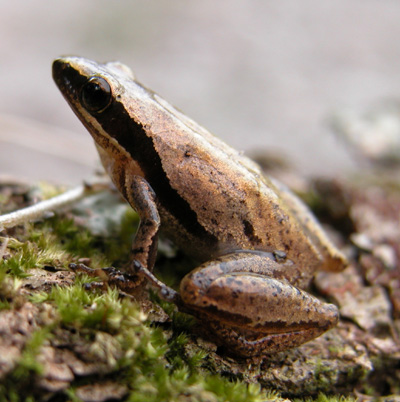
little grass frog habitats/range
flatwoods, grassy fields, ditches, swales, isolated wetlands that lack predatory fishes; all state except tip of panhandle
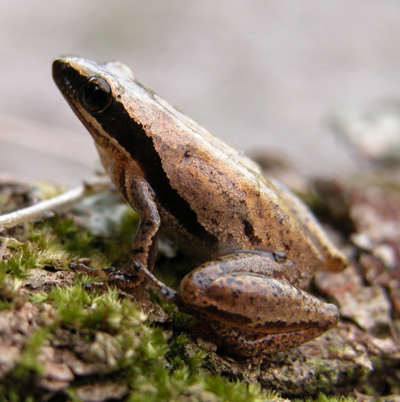
other info about little grass frog
smallest terrestrial vertebrate in NA- only to ~0.5 in, call sounds like an insect
ornate chorus frog identification
stout-bodied frog, green, brown, and gray morphs; prominent dark markings on sides; dark mask
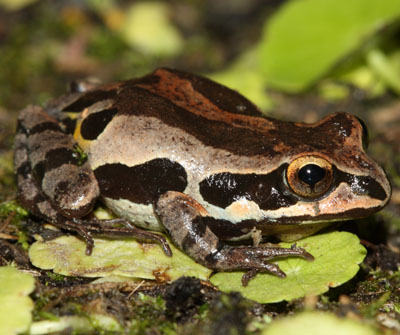
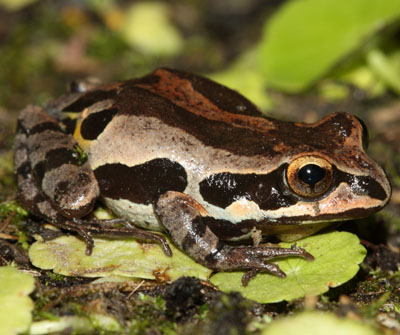
ornate chorus frog habitats/range
sandhills, flatwoods; only breeds in isolated wetlands that lack predatory fishes; north fl and panhandle
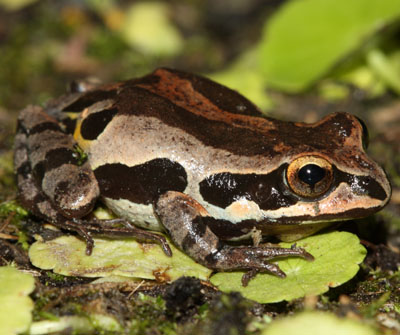
other info about ornate chorus frog
one of our most beautiful frogs, sig declines over past 10 yrs in NFL
fl cricket frog identification
small aquatic frog, highly variable color and pattern, triangle on head, ‘grilled’ pattern on thighs
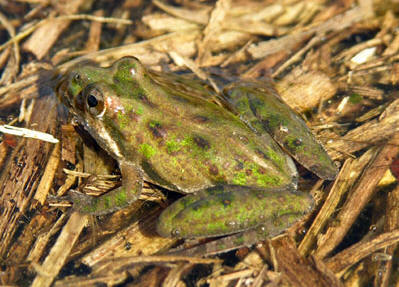
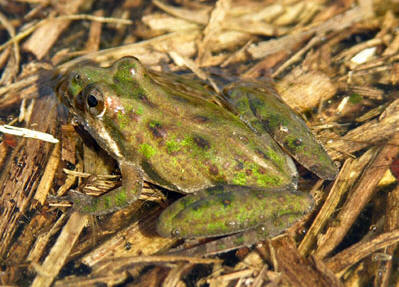
fl cricket frog habitats/range
lakes, prairies, isolated wetlands; most of state except tip of northern panhandle
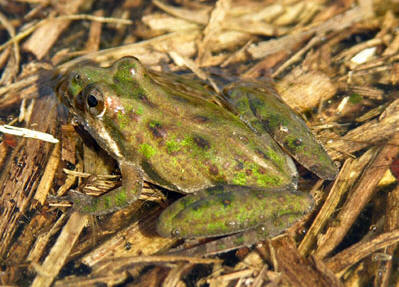
fl cricket frog other info
can be very abundant, active during the day and night, extensively webbed rear toes for a hylid, only to about 1 in in length
family microhylidae- narrow mouthed ‘toads’ characteristics
-1 native sp
-not a ‘true’ toad: skin not ‘dry’, no parotoid glands
-pointed snout
-fold of skin btwn eyes
-long, thin, rear toes with no webbing
-ant specialists
eastern narrow-mouthed toad identification
brown or black with mottled pattern, very pointed snout, fold of skin on head, long and thin rear toes unwebbed
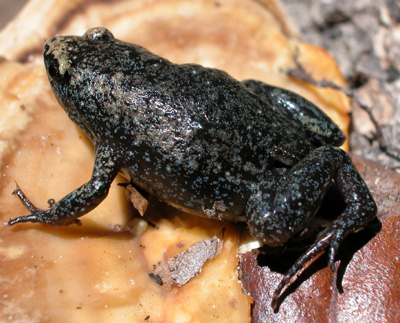
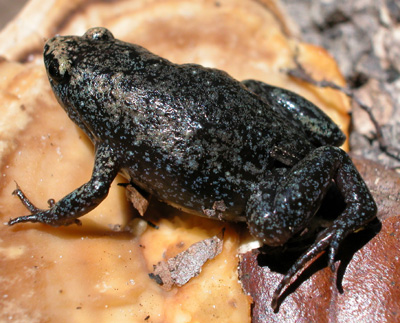
eastern narrow-mouthed toad habitats/range
flatwoods, sandhills, hammocks, suburb settings; isolated wetlands that lack pred fishes; all state
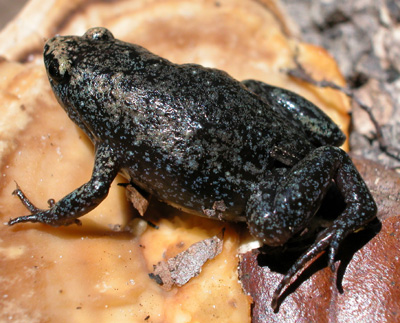
eastern narrow-mouthed toad other info
ant specialists, long unwebbed toes, slimy little frogs
family scaphiopodidae - spadefoots gen characteristics
-1 native sp
-’dry’, rough, slightly warty skin
-stout bodied
-parotoid glands inconspicuous/flat
-very reduced toe webbing
-vertical pupils
-prominent spade on rear feet for digging
eastern spadefoot identification
brownish frog with hourglass shape on back, small warts, vertical pupil, prominent spade on rear feet, warts reddish
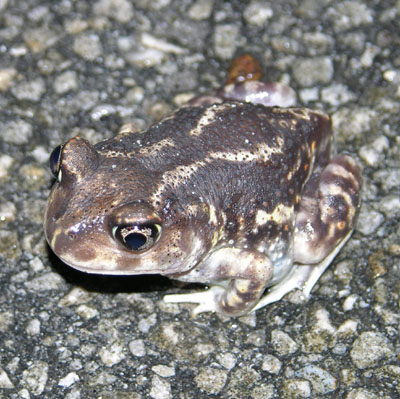
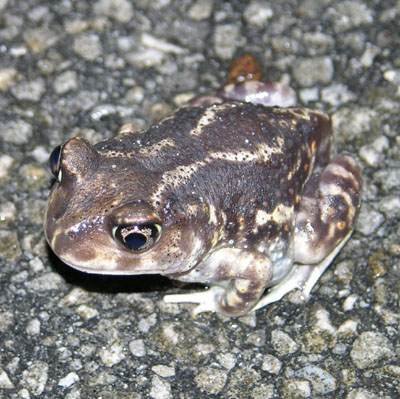
eastern spadefoot habitats/range
hammocks, sandhill, some suburb settings; breeds in the most ephemeral ponds which lack fish; all state except southern/central ish fl
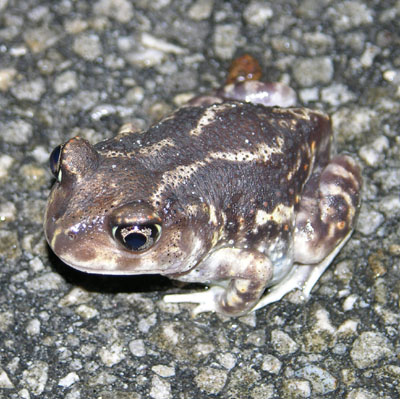
eastern spadefoot other info
breed only during very heavy rainfall, explosive breeder, tadpoles school, very short larval period, use spade to burrow
family ranidae- ‘true’ frogs gen characteristics
-largest FL’s frogs
-8 native sp
-extensive webbing btwn rear toes in most
-primarily aquatic
-bullfrogs and such
-genus Rana; other genera proposed for NA “ranids” include Lithobates, Aquarana, and Pantherana (leopard frogs and gopher frogs)
southern leopard frog identification
green and brown w numerous large spots, dorsolateral ridges/folds, pointed snout, white spot in tympanum
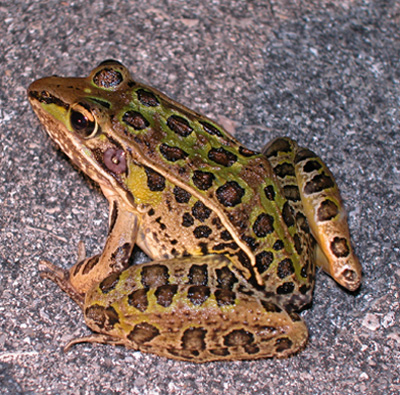
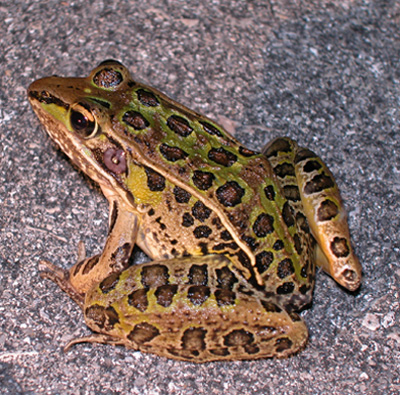
southern leopard frog habitats/range
a diversity of aquatic habitats- lakes, marshes, swamps, isolated wetlands, ditches, retention ponds; all state
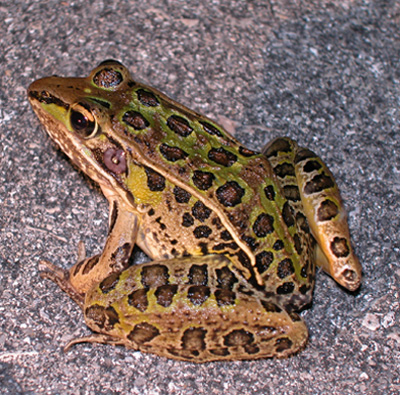
southern leopard frog other info
winter breeder, strong jumper, paired vocal sacs, very common ranid frog
bronze frog identification
smallish brown/bronze colored frog, prominent dorsolateral ridges, no spots on the back
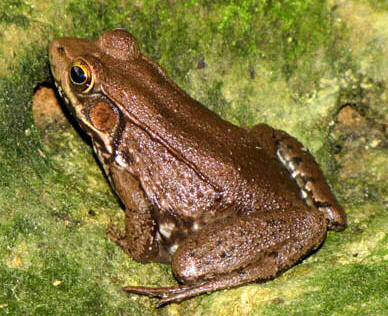
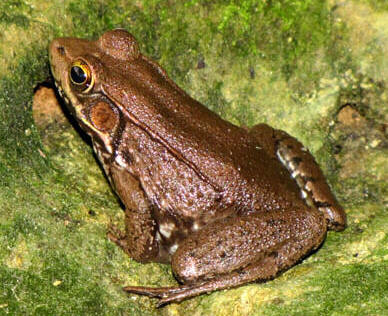
bronze frog habitats/range
riparian habitats, floodplain swamps, margins of lakes, will breed in ditches, north fl and panhandle
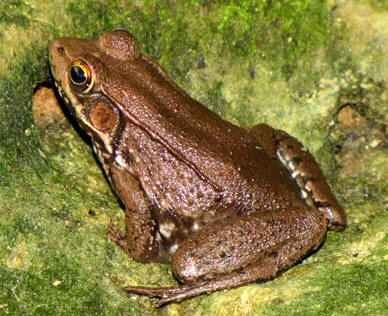
bronze frog other info
call sounds like pluck of a banjo string, sexually dimorphic tympanum, males est and defend territories, referred to as Green Frog in northern part of range
fl bog frog identification
smallish frog, back yellow-green to brown, obvious dorsolateral ridges, very reduced toe webbing (compare to Brnz frg)
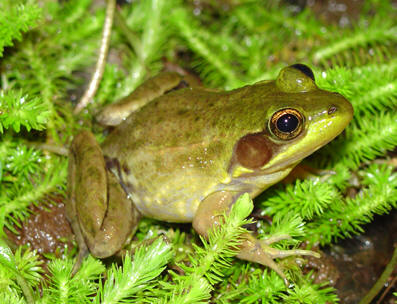
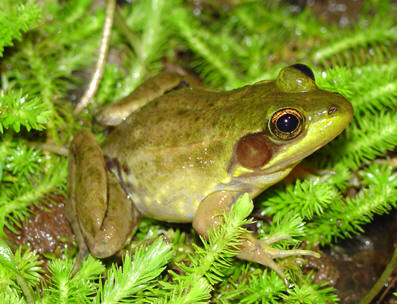
FL bog frog habitats/range
seepage bogs and stream edges, breeds in still pools; only found in Okaloosa, Walton, Santa Rosa Cos. - endemic
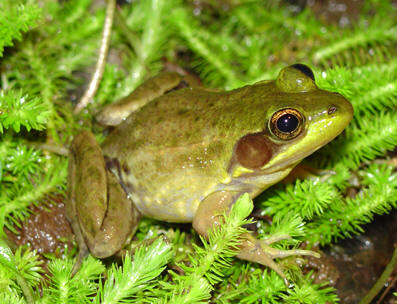
other info about fl bog frog
not likely to encounter this frog unless u are looking for it, smallest FL ranid, discovered in 1982
fl gopher frog identification
large gray frog with big dark spots, light colored dorsolateral ridges (flattened)
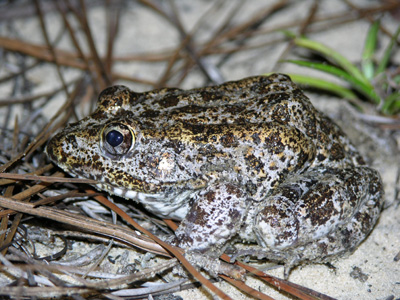
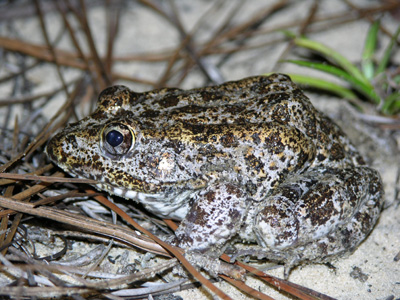
fl gopher frog habitats/range
scrub, sandhill, scrubby flatwoods; breeds in isolated wetlands that lack predatory fishes; most of state except tip of panhandle and south central fl/south south fl
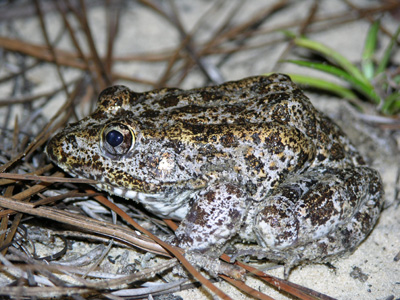
fl gopher frog other info
most terrestrial ranid, live in GT burrows and other burrows, found well away from H20, sp of conservation concern in FL
pig frog identification
large greenish frog, jagged ‘stripes’ on thighs, toe web extends to last digit of 4th rear toe
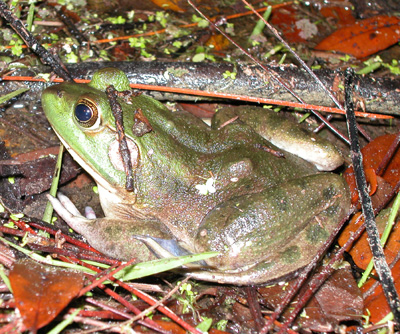
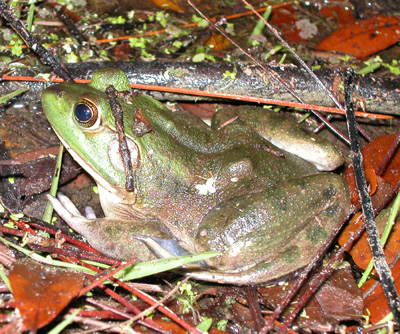
pig frog habitats/range
lakes, marshes, swamps, small isolated wetlands; all state
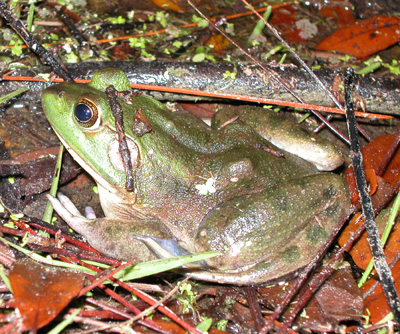
pig frog other info
looks similar to bullfrog, source of native frog legs in FL, call is a pig-like grunt, mainly a summer breeder, large tadpoles
american bullfrog identification
large brown or greenish/olive colored frog, often w mottled pattern on body and rump, toe web not out to last digit of 4th toe
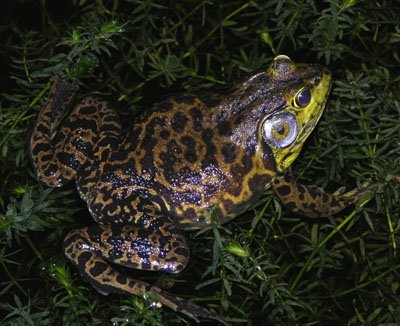
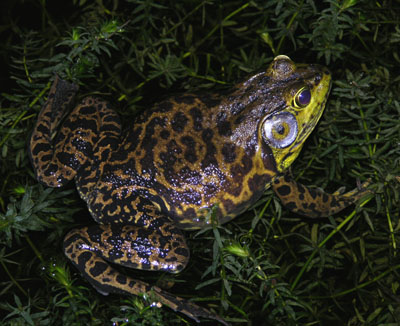
american bullfrog habitats/range
in FL often in small isolated wetlands, not so much a lake sp; most state except south fl
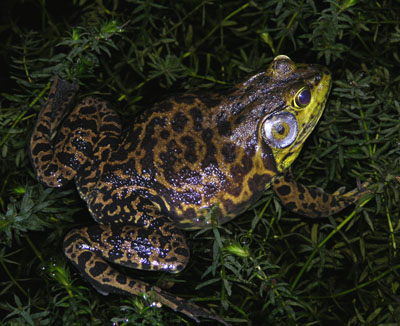
other info about american bullfrog
largest native frog, tympanum sexually dimorphic, invasive in western US, large green tadpoles in peninsular FL
river frog identification
large dark brown frog, dark reticulate pattern on belly, white spots on lips, no dorsolateral ridges
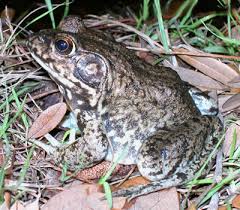
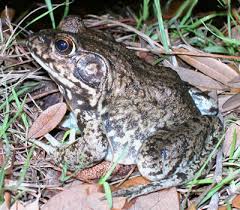
river frog habitats/range
riparian habitats, lakes, rivers, springs; north fl including panhandle
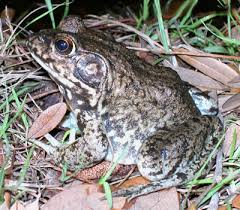
river frog other info
very large, dark tadpoles with dark border on tail fin; tadpoles form schools
carpenter frog identification
smallish frog, light stripes on sides (2 on each side)- no dorsolateral ridges, longest toe extends well beyond webbing
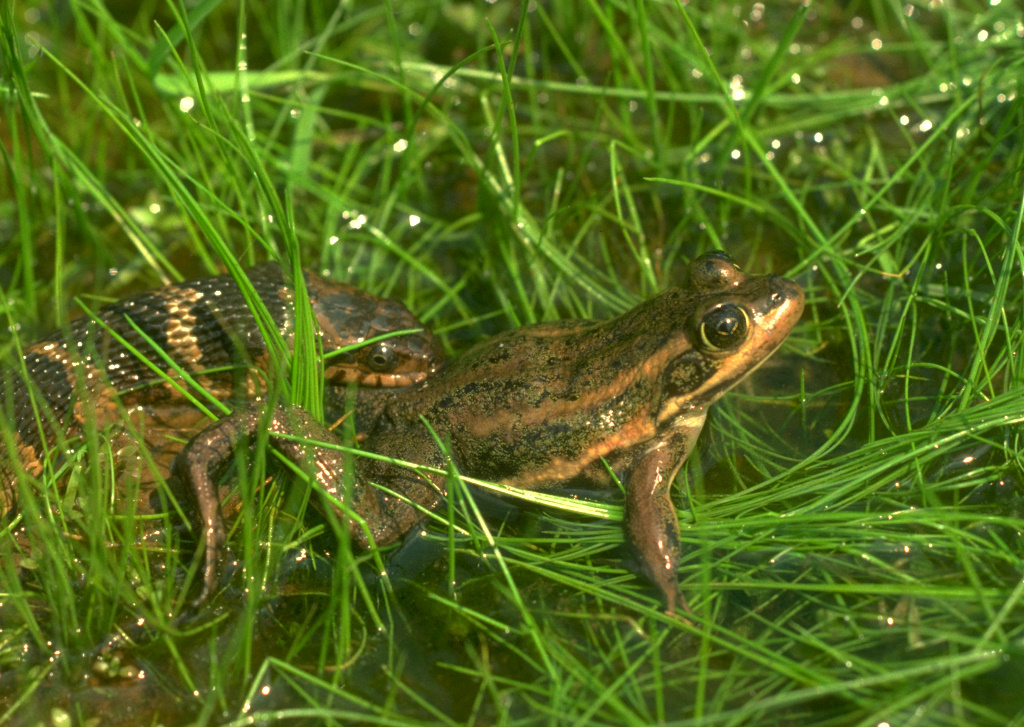

carpenter frog habitats/range
sphagnum bogs, Okefenokee swamp; only 2 counties in NFL
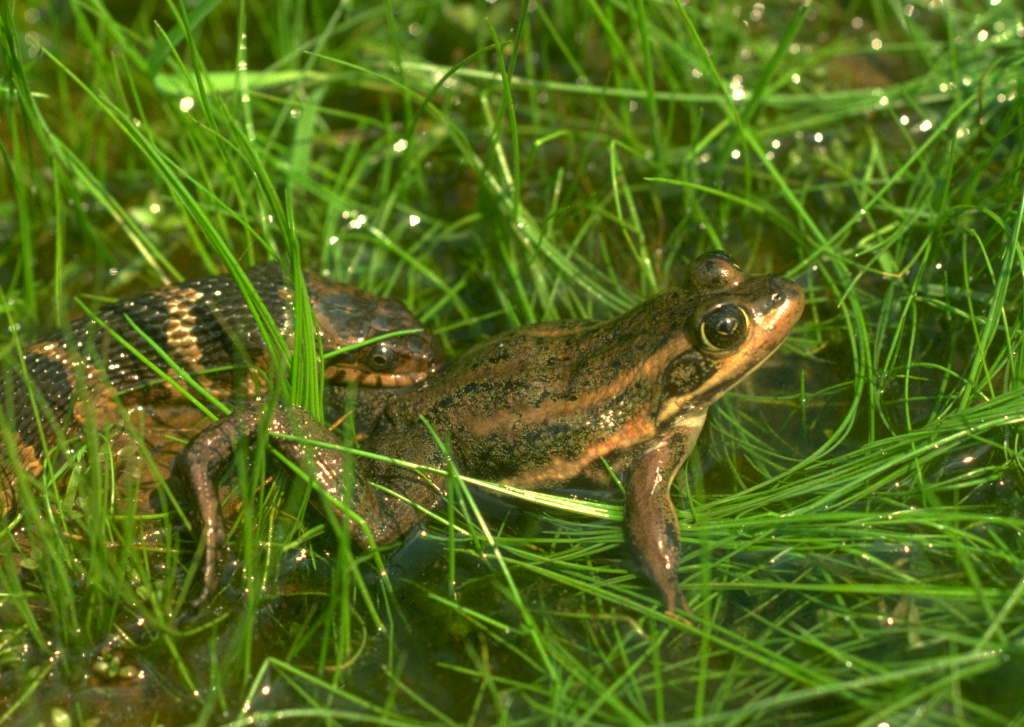
carpenter frog other info
not likely to encounter this frog, call reminiscent of a nail being hammered, one of smallest FL ranids